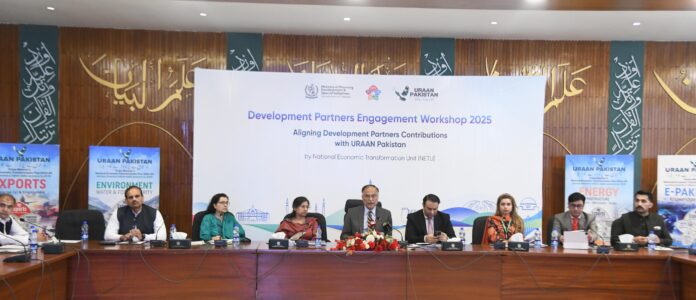Pakistan Aims for $1 Trillion Economy by 2025, $3 Trillion by 2047, says Ahsan Iqbal
ISLAMABAD, May 16: Federal Minister for Planning, Development and Special Initiatives, Prof Ahsan Iqbal, on Thursday articulated the government’s long-term economic vision aimed at transforming Pakistan into a modern, knowledge-based and inclusive economy, while calling upon development partners to continue their collaborative role in supporting Pakistan’s reform and development agenda.
Addressing the Development Partners Workshop in Islamabad, the Minister extended his appreciation to multilateral and bilateral institutions for their sustained support during national emergencies, public health crises, and economic challenges. He remarked that the solidarity shown by development partners had been both “timely and transformative,” particularly in times when Pakistan faced some of its most testing circumstances.
The minister said that Pakistan, like many countries in the Global South, faced a complex set of challenges including fiscal constraints, climate shocks, food and water insecurity, and development gaps. However, he noted that the country also stood at the cusp of significant opportunity, given its young and growing population—65 per cent of whom are under the age of 30.
Outlining the government’s economic transformation plan titled Uraan Pakistan, Prof Iqbal said the vision aims to position Pakistan as a $1 trillion economy by 2025 and a $3 trillion economy by 2047. The roadmap, he said, is anchored in the “Five Es Framework”—focusing on Exports, E-Governance, Equity and Empowerment, Environment, and Energy—as key pillars for strategic development.
Under the first pillar of Exports, the minister stressed the need for diversifying Pakistan’s export base beyond textiles to sectors such as information technology, pharmaceuticals, food processing, creative industries, and the blue economy. He highlighted ongoing efforts to expand global market access through Special Economic Zones under CPEC, and regional connectivity via Central and West Asian corridors.
On E-Governance, Prof Iqbal said the government had launched the ‘Digital Pakistan’ initiative aimed at digitising public services, expanding broadband coverage, promoting digital literacy, and enabling youth-led entrepreneurship. He stated that Pakistan’s IT exports had already crossed the $2.5 billion mark and held significant potential for growth. He invited development partners to contribute in building digital infrastructure, nurturing human capital, and enhancing cyber resilience.
The third pillar, Equity and Empowerment, places citizens at the centre of the development process. The minister highlighted initiatives aimed at improving health, education, nutrition, and skills development, alongside programmes for gender equity and economic inclusion in less developed regions such as Balochistan, Gilgit-Baltistan, and the newly merged districts of Khyber Pakhtunkhwa.
He also announced the declaration of a “national education emergency,” acknowledging the urgent need to bring over 23 million out-of-school children into the education system if Pakistan is to remain competitive in the 21st century.
“Our goal is to leave no one behind,” he emphasized, calling on development partners to collaborate on innovative solutions to address the country’s human development deficits.
Prof Iqbal concluded his address by reaffirming the government’s commitment to reform, inclusive development, and strategic partnerships. He called upon the development community to continue playing a constructive role in enabling Pakistan to realise its long-term goals. “Together, we can turn Pakistan’s potential into sustainable progress,” he remarked.



